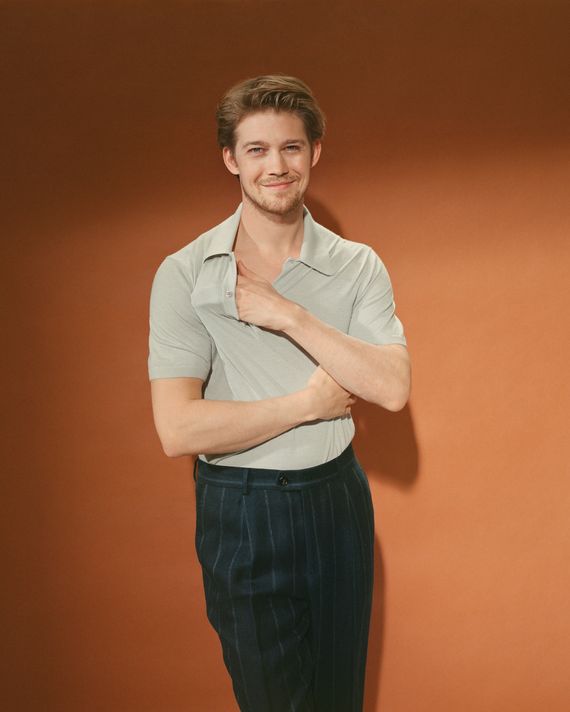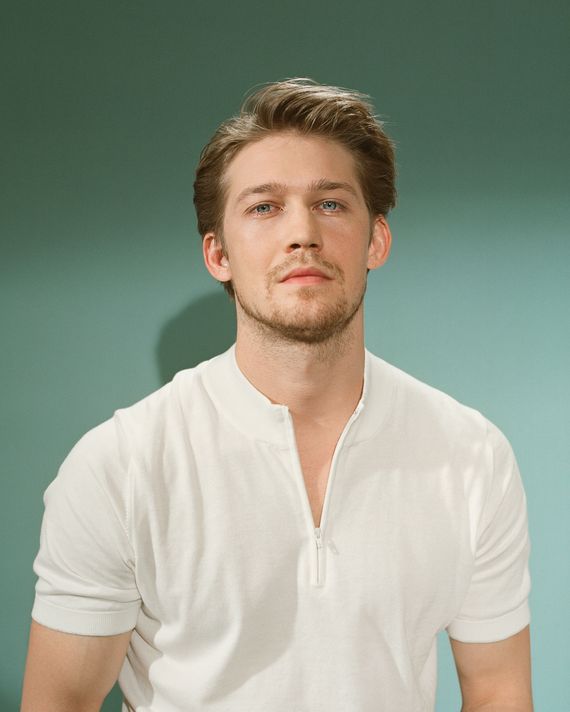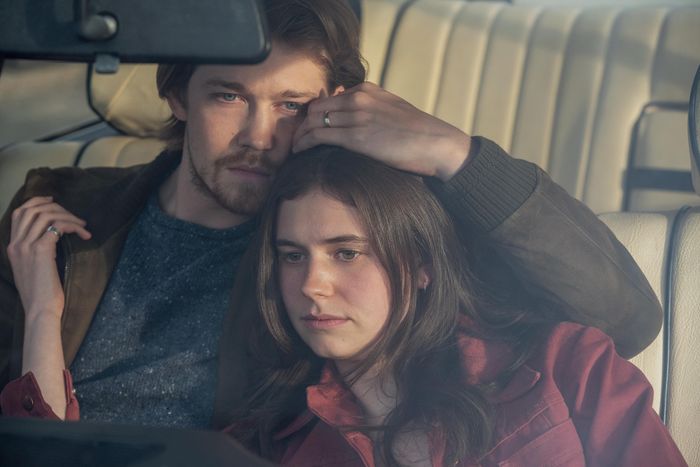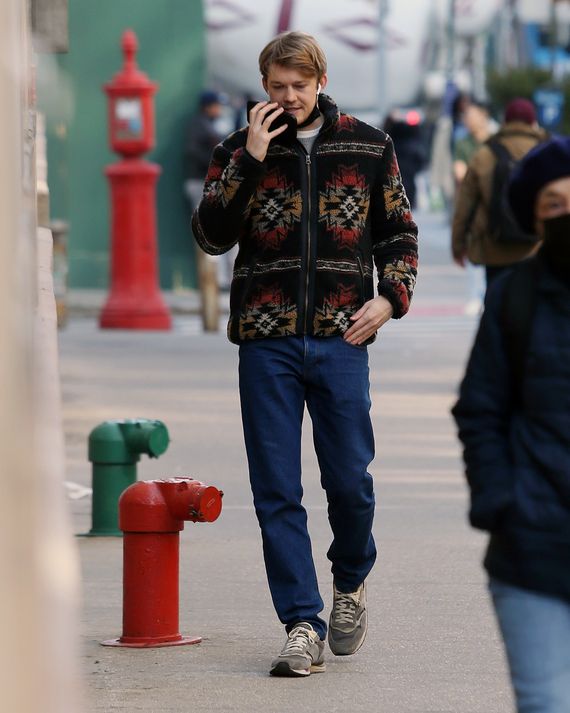
Joe Alwyn currently occupies one of the strangest spaces in the greater celebrity matrix. He’s not yet the sort of movie star your parents would recognize at the airport and text you about, nor does he have the box-office draw of a Chalamet or Pattinson, at least not yet. The 31-year-old has been working steadily in film and television since his straight-out-of-British-drama-school debut as the lead in Ang Lee’s 2016 high-def experiment Billy Lynn’s Long Halftime Walk. He racked up a series of well-received supporting roles in big period Oscar dramas and small critically appreciated indies, usually playing a Ken-doll-faced dick (Harriet, Operation Finale, Boy Erased, The Last Letter From Your Lover) or a blushing Brit from a bygone era (The Sense of an Ending, The Favourite, The Souvenir Part II, Mary Queen of Scots). Now, his first lead role since Billy, in Hulu’s second Sally Rooney adaptation, Conversations With Friends, threatens to make him fully Recognizable to Moms.
For a specific and rather substantial subset of the global population, however, Alwyn is not only a household name but a dinner-table centerpiece. To Google him is to stare straight into the stan-culture abyss. Lengthy YouTube videos are dedicated to his rare and rather unremarkable public interactions with his overwhelmingly famous longtime girlfriend — “Taylor Swift turns around to look at her boyfriend, Joe Alwyn, and sticks her tongue out at him” — or to the opaque references the two have made to the mere fact of each other’s existence. Breathless lists of “everything Taylor and Joe have said about their private relationship” abound in the Us Weekly universe. Alwyn is left to choose his words and body language wisely or risk their becoming permanent parts of the elaborate Swiftian canon. The man is not simply well-versed in the art of concealment; he is the Criss Angel of conversational dynamics. In interviews, he often demonstrates an ability to politely answer a question while revealing absolutely nothing about himself, sometimes even backtracking mid-answer to negate a benign detail. (From a recent piece in Mr. Porter: “Well, do you like football?” asks the reporter. “Football?” replies Alwyn. “Yeah. Am I allowed to say those kinds of things?”)
Yet he believes he has gotten better at the whole press thing over the years. “I don’t think I don’t enjoy interviews,” he says carefully. “I think I have seemed guarded.” He definitely “would like to not seem so guarded in them.” I can see those contradicting desires roiling inside Alwyn now, sitting across from him on the patio at Fairfax, in the West Village, for lunch. His energy is vaguely uncomfortable but determined, like that of someone preparing to swim laps in the English Channel in January to prove something to themselves. Perhaps sensing he has already revealed too much, he falls back on one of his tried-and-true lines: “If you were to ask a stranger on the street questions about their private life, let alone with the intent to then post it everywhere, why would that person not be like, ‘Sorry, what, why?’ So why would I not be like that?” He points at a woman sitting across the way from us who is, to my knowledge, not on a press tour. “I’m not going to go over there and ask that woman about her personal life.” “Actually, maybe you should,” I suggest. “I mean, I might do later,” he says, now looking cheered. “I’ll just holler across the street.”
Alwyn orders a Guinness (which is not available, so he opts for an IPA) after confirming I will also be drinking. “I’m just clinging on to that Irishness,” he says, referring to the five months he spent filming Conversations With Friends in Belfast. I start with some simple questions — When did he realize he wanted to act? What was he like as a child? “See, these are the questions I find hard,” he says. Was he introverted? Outgoing? Sporty? “I was on the introverted side but not a crippling introvert. Like an extroverted introvert,” he answers. “Is that allowed?”
In small spurts, I learn Alwyn was “not hammy” as a youth — instead, he was the family baby, “displaced” at age 12 by a new sibling, and an athlete who realized what he really wanted was to act. He kept his burning theatrical desires quiet, à la Zac Efron in High School Musical. He admits to an early obsession with Baz Luhrmann’s Romeo + Juliet and talks joyfully about how he was brought up watching “random French movies” with his documentary-filmmaker father and psychotherapist mother. Occasionally, he broke free from the chains of jockdom and played Banquo in a version of Macbeth performed entirely on Rollerblades, and Snowy the dog in a production of Tintin despite looking exactly like Tintin: “Snowy was more of a stretch.”
Alwyn says he “secretly would look up drama schools online” as a teenager. Once in university, he applied to four and was rejected by all but one. He was yanked out in his last year by Lee, who had fought with the studio to cast an unknown as the naïve, PTSD-ridden Billy Lynn. “It was terrifying and surreal and happened so quickly,” Alwyn remembers. Critics were almost unilaterally derisive of the film, but Alwyn was praised for his naturalism, his believable innocence, and, per one review, a “cuteness roughly akin to that of Matt Damon in Good Will Hunting.” Like most things that have happened to Alwyn, that image has proved to be both a boon and a curse. Directors feel they must either play off it directly (place him somewhere in the past when evidently it was more normal to look like that; make him the evil, rich trophy husband to 1960s amnesia victim Shailene Woodley; cast him as Margot Robbie’s devoted, winsome courtier) or subvert it (he looks this way because he is an actual Nazi). Before filming Billy Lynn, Lee had been concerned that Alwyn was “too handsome” to play a run-of-the-mill contemporary dude; ultimately, he decided Alwyn’s face is “so compelling it doesn’t matter.”
The conversation about his looks gets meta in Conversations. In the series, he plays Nick, an emotionally walled-off, married, 30-something actor who begins an affair with a college student and slowly lets his guard down. His character is a classically attractive, heavily restrained man with hidden depths who struggles to be taken seriously while everyone around him says stuff about his face. In one scene, he and his paramour, Frances, are bidding each other farewell after a drawn-out romp when she blurts out, “You’re so handsome.” Nick turns pink. “I thought you were attracted to my personality,” he jokes half-heartedly. “Do you even have one?” replies Frances, who then looks equally humiliated. Alwyn begins mock-pulling at his cheeks and widening his eyes at any talk of said face. “Two eyes, one nose, one mouth,” he says. “I don’t know what to say.” But did he relate to that moment with Nick and Frances? “It’s not something I wrestled with,” he says, studying me as he spoons up some steak tartare. He tenses a bit. “What are you trying to get me to say about my face?” I explain that I have no specific face-related agenda, and he visibly relaxes. “No, sorry, I’m sure,” he says. “I would much rather work with an interesting director in a smaller, weirder, darker part, than something big and obvious and getting typecast just for the sake of it.”
COVID had messed up his plans to star in an “Emily Brontë origin story,” so he put himself on tape for Conversations director Lenny Abrahamson one weekend at an unnamed friend’s “beautiful, immaculate” house. Thinking he needed to look older than his three decades to play the mid-30s Nick, he went upstairs to find a jacket from his friend’s “older husband,” where he found a paperback copy of Conversations With Friends lying on the bedroom floor. He got the part a week later. “I’m not superstitious,” he adds, before spending the next five minutes discussing the things he actually is superstitious about — namely, and randomly, magpies. (“If I see one, I’m like, ‘Oh, shit,’” he says, whipping out his phone to show me a photo of a magpie, appearing genuinely thrilled to be talking about this.)
Alwyn’s performance in Conversations is his best yet. He’s convincing as a sensitive, depressive guy who desperately wants to open up to someone but doesn’t quite know if it’s safe to do so. The role is bold. There are more sex scenes per capita in this series than anything he has ever done, scenes of the caliber and intimacy that turned Paul Mescal, the previously unknown star of Hulu’s first Rooney adaptation, Normal People, into an icon of early-pandemic-era sensuality. “When they sent the audition, they said, just as a heads up, that it would be to sign up for the possibility of full frontal,” Alwyn says, though he ended up going tush-only. Is he prepared to be the subject of a new type of public frenzy? “To be honest, I forget that other people will see it.”
In the summer of 2020, Swift surprise-released the Grammy-winning album Folklore. Fans speculated endlessly about the identity of William Bowery, a mysterious co-writer on two songs. That November, Swift revealed that Bowery was in fact Alwyn and that the pair had taken up songwriting together in quarantine. I assume Alwyn will give me one of his speak-arounds on the subject. Instead, he leans forward, putting his English Channel–swimming face back on. “What would you like to know?”
Although he grew up playing a bit of piano and was the guitarist in a “crappy school band called Anger Management,” Alwyn doesn’t consider himself a musician or songwriter and insists that he is, in fact, an awful singer. He was merely “messing around” on the piano when Swift heard and walked over, intrigued. He had been singing the fully formed first verse to the song that became “Exile.” (Bon Iver handles the male vocals on the final version.) “It was completely off the cuff, an accident,” he says, shrugging. “She said, ‘Can we try and sit down and get to the end together?’ And so we did. It was as basic as some people made sourdough.”
I press him on this point — he wrote an entire verse to a Taylor Swift song without trying? “Who doesn’t walk around the house singing?” he asks. I explain that it’s unusual for hit songs to spring forth like that from nonmusicians’ heads. He says he wasn’t trying to write to Swift’s personal sound but had been listening to a lot of the National (Aaron Dessner ended up producing the album). Alwyn wrote the chorus for “Betty” just as casually, albeit less soberly: “I’d probably had a drink and was just stumbling around the house. We couldn’t decide on a film to watch that night, and she was like, ‘Do you want to try and finish writing that song you were singing earlier?’ And so we got a guitar and did that.”
Initially, Alwyn didn’t want his name credited, anticipating that what he describes as the “clickbait conversation” would distract people from actually listening to the music. So he went by William Bowery as a nod to his music-composer great-grandfather and the Manhattan street. But then he recognized the “clickbait conversation” was happening anyway — “I don’t say that vainly,” he adds quickly — so why not let the world know it was him? He stresses his blissful ignorance of, say, those videos dissecting his relationship with Swift: “I’m aware of those when people tell me in these situations.” It seems like a healthy, practiced denial; he has worked at tuning this shit out because otherwise he might never utter a single syllable again. And despite having a face that launched a thousand Swift songs, at certain angles in his normal-boy outfit, he does have a certain ability to blend. None of the other 30-somethings lunching at Fairfax seem to have any clue who he is. “I suppose it’s not as if you’re Jennifer Lopez,” I joke. “I beg to differ,” he shoots back with a laugh. “I am Jennifer Lopez.” I start to warm to Alwyn. He knows that what he wants (privacy) and what he has to do (publicity) are fundamentally at odds and has embraced that contradiction with dry, charming wit.
We’ve finished our food, which means the moment we’ve both been dreading can no longer be avoided. “You have things you have to ask,” says Alwyn, folding his hands together. “And I’ll either choose to answer or not.” I look him gamely in the face and ask if he is, indeed, betrothed to marry one Taylor Alison Swift. He exhales. “The truth is,” he begins, “if I had a pound coin for every time someone told me I’ve been engaged or I’m getting engaged, I would have a lot of pound coins. If the answer was yes, I wouldn’t say. If the answer is no, I wouldn’t say.” I’m struck briefly speechless. It is perhaps the best non-answer I have ever received. I ask him how often he’s practiced it, and he explains that recently, back home in the U.K., a journalist had tried to sneakily phrase the engagement as a statement rather than a question. “You’re not the first person to ask,” he says. His tone conveys that he understands I will also not be the last.
Before I release Alwyn back into the wild, I ask why, in one of his rare forays into celebrity endorsement — a perfectly confusing Tom Ford perfume commercial — he appears physically appalled by the sight of his own neck in the mirror as he sprays himself with the scent. “How dare you!” he says, laughing, looking both offended and delighted. “If that’s not how everyone puts perfume on themselves, then I’ve been lied to.” He suddenly remembers his professional obligations: “Tom Ford’s amazing as a person.” He stands up and bids me a polite farewell. Walking solo toward Tribeca, he is instantly snapped by the paparazzi.





